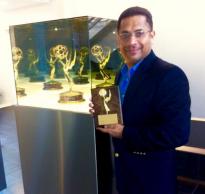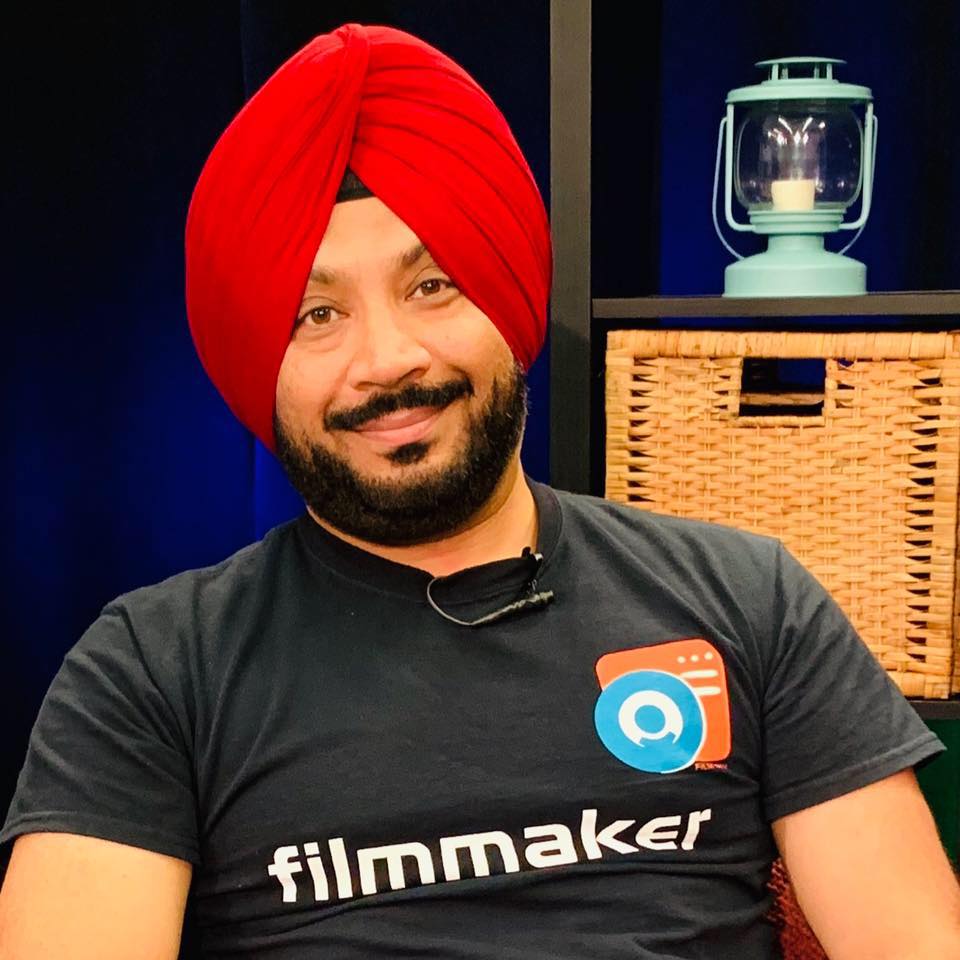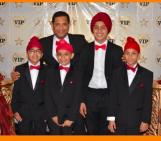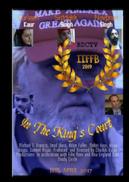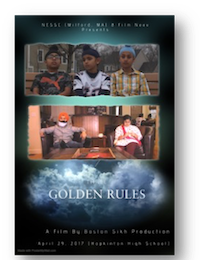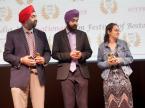During the day, Harbaldeep Singh is a Product Management Leader with extensive experience in the successful launch and development of products in the Healthcare, Digital Media and E-commerce sectors.
In his past time, he follows his passion for Filmmaking and TV Production as a mentor and teacher. He has founded two non-profit organizations: Film Neev and Nishkam TV. Both organizations hold an overall mission to impart formal filmmaking and TV Production education to students, as well as providing a befitting platform to those who aspire, pine and want to reach the highest pinnacle in the domain of media.
Previously, he has founded a media company, PTI Media Networks, and has successfully launched a popular TV show, “What’s Up TV†for the South Asian community living in New England. Before this, he has also written, directed, and acted in various plays and short films. He has also played the lead role in an English film, “Perceiveâ€.
Harbal is a recipient of the 62nd Primetime Emmy Award for the invention of a media technology used extensively in Film and TV Productions. He also received a US patent for inventing a video streaming technology for the video editing software.
Harbaldeep Singh lives in Massachusetts USA with his wife Rajni Singh and two beautiful kids, daughter Tanya Singh and son Aekem Deep Singh.
His education includes an MBA (Healthcare Product Strategy), MFA (Film and Television) and B.Tech (Computer Science)
Can you tell us a little about your professional life?
By training, I am an engineer. I was an undergraduate in Computer Science. After working for ten years as a software engineer, I decided to leave my job and pursue my passion for filmmaking. I received a degree in Film and TV Production and ventured into the world of filmmaking. After working in the film industry for a few years, I combined my strengths in Computer Science and Filmmaking and worked as a Product Designer for Avid Technology. Avid Technology is a well-known company, known for its makers of software and hardware tools used by Hollywood and every major TV studio. I believe when you combine your formal training with your passion – magic occurs. This turns work into play. While working at Avid, I received a 62nd Primetime Emmy Award for inventing a media technology used extensively in Film and TV Productions. I also received a US patent (US 20120257877) for creating a streaming technology used in video editing software.
Later, I received my MBA in Healthcare Product Strategy. Since then, I have been a product management leader in the healthcare space working for a very successful Healthcare Information Technology company based in the Boston area.
My education in Science, Arts, and Business has enabled me to learn the required skills for the media industry - an industry that requires all three of these skills to be successful. These skills have enabled me as a social entrepreneur and have allowed me to initiate and organize non-profits startups, raise funds, build a team and execute on the vision to teach students the art and science of filmmaking and TV Production.
How did you get interested in film production?
While I was growing up, I always felt fascinated by moving images of Film and Television. I was curious to know more about the art and science of Film and Television production. As time crept closer to choosing a career path, I broke the news to my parents that I wanted to go to Film School (Pune Film Institute in India). As expected, it solicited a big no-no from them. The reason being, the film industry was considered an exercise in vain, perceived by the world of materialism and pragmatism. I had to cave into my parents’ wishes to join the time-tested field of engineering, catapulting me to America. But as the cliché says, it was a blessing in disguise: I realized my dream of getting a film education from America.
Could you describe the invention that won you an Emmy?
I got this Emmy while working at Avid Technology. Avid is a well-known name in the Film and TV Industry. Thirty years ago, Avid created a revolutionary video editing product, Media Composer, which allows non-linear editing of the video content. Even today, most of Hollywood and Bollywood films and TV content are edited using this software.
When TV production cameras transitioned from tapes to tapeless media (SSD drives and SD cards we use in our cameras), we built a product that worked towards improving the process of working with tapeless media. This product eliminates the time-consuming transcoding processes and saves time and money in the production process. It helped advance TV production by providing customers with a faster, more reliable and cost-efficient way to work with tapeless media and allowed productions to air at a faster pace. As a result, The Academy of Television Arts and Sciences awarded this Emmy for engineering excellence.
Later, I received a US patent for inventing a video streaming technology using the same architecture for buying and selling video and audio content from within the software.
Could you tell us about Film Neev and films from that program that have been featured in film festivals?
Teaching is in my DNA. My parents and my sister are teachers. In 2016, I conducted a one-week film summer camp for kids to bring my passion for teaching and filmmaking together. There was something beyond that one-week film camp. The cul-de-sac opened after meeting such talented kids and I found the much-awaited playground to see my ideas seeing the light of the day in the shape of the genesis of a non-profit organization, Film Neev - A film school for kids.
In 2017, I moved this film program to New England Sikh Study Circle (NESSC) Gurdwara in Westborough. The mission of the program is to enable our youth, our future filmmakers to tell stories of the world surrounding them, the world they perceive, and the world they would like it to be. The program is designed with an emphasis on collaborative problem solving, critical thinking, and self-confidence by rotating through all aspects of filmmaking in a fun environment. The program covers many different aspects of filmmaking to help them become well-rounded filmmakers such as Acting, Story/Screenplay Writing, Camera/Lighting, Video/Sound Editing, and Direction.
Last year, our film In the King’s Court was an official selection at India International Film Festival of Boston (IIFFB) 2019 in the student short film category. The Film Festival was held from Sep. 13 - Sep. 15 at JFK Library and Boston University's Wheeler Family Theater.
Our film was one of 22 movies selected from the 70+ entries received by the festival and was a finalist for the best film in the student short film category. We did not receive the award for the best film, however, the jury awarded our film an appreciation award for the relevant content in modern times.
It was a proud moment for Film Neev and our program to get recognized by the IIFFB organizing committee. As a teacher, it was an emotional and proud moment for me to see these young kids on the red carpet, getting to the big stage, and giving their acceptance speech. It was also special because, at this very young age, kids got exposure to watch films with diverse themes, interfaith, and different points of view. More than a film festival, it was a real-life classroom for them.
We recently were given the news that another one of our films, Three Golden Rules is a finalist at the Chelmsford Film Festival. This movie is based on the basic three tenets of Sikhism (Remembering God, Sharing what you have with others, and earning a living through honest means and hard work). The red carpet event was on March 14th, however, it was postponed due to the current coronavirus situation.
As a filmmaker, what inspired you to tell Sikh stories?
Today more than ever, Sikh Americans experience Islamophobia and bear the brunt of racism and discrimination as a result of their identity. The number of reported hate crimes is on the rise, and intolerance seems to be becoming the norm. Through these programs, we have chosen to fight ignorance with education and using film as a means to accomplish this as an effective, creative, and incredibly inspiring medium. Education is usually associated with academics - with articles, classroom lessons, and books. However, many times the most impactful lessons are conveyed through media forms, which is why this effort is so significant. These films expressed core values of Sikhism - service, equality, humility, and more - in humorous, heartwarming packages that were relatable and more accessible than academic jargon. With creative efforts like these, we have the chance to engage wider demographics, which is integral in the movement to create a conversation about Sikhism. To see the next generation combating hate with love is revolutionary, and is something adults across faiths and races can learn from.
Could you tell us a little about Nishkam TV?
Nishkam TV is the next step in the Film Neev evolution by providing students a platform with the mission-centered around providing wholesome media content through the Sikhi lens regarding selfless service, building dialog, increasing understanding, and promoting interaction between different faiths and cultures to bring us closer as one humanity and enhance our lives.
It is a first-ever online TV channel run exclusively by students and is available online on our website and on our YouTube, Facebook, and Instagram social media channels. We have a student body comprising of seven teams – Content, Production, Talent, Website and Newsletter, Marketing, Social Media, and Design. Students can join each group based on their interest level. Each group is supported by two adult team advisors and youth representatives. Youth representatives are students who are currently in college or graduated.
We currently have three mentors and an eight-member advisory board.
So by numbers, we have – 7 teams, 52+ students, 12 teachers/team advisors, 5 youth representatives, 3 mentors, and 8 advisors. (Meet our team)
Though I am the face of these programs, these non-profits won’t be possible without the support, mentoring and hard work of multiple people. I would like to thanks Harinder Soin ( Chief Data Officer at Cambridge Associates) for instituting these programs at the NESSC School and for mentoring and guiding me at every step, Dr. Amar Sawhney (a serial entrepreneur) for supporting our vision as our biggest patron, Management Executive committee of NESSC for supporting us by providing space and building us a state-of-the-art soundproof TV studio with video editing equipment and last but not the least all parents for volunteering and providing support.
What advice do you have for aspiring filmmakers?
In my opinion, filmmakers play a big role in being a mirror to society through their stories. So I want to see these young aspiring filmmakers as future leaders. To be effective leaders first, they need to become producers of content, rather than mere consumers of content. This means instead of only watching films and TV as consumers; they need to learn this craft and in the future, become a producer of content by telling their own stories. Film and TV production are the most collaborative art form, which means, like a painting, you cannot create visual content alone. To create visual content, you need a team. So, my advice to them is to learn how to be good collaborators, how to respect other ideas, how to be an effective team player, communicators, and writers. These soft skills will help them not only with film and TV production but in any field they chose as their career path.
Any message for our viewers?
With smartphones in our pockets, with built-in high-definition video cameras and social media at our fingertips, we are all citizen journalists. So my message to all our viewers is that we need to tell and share our own stories which combat ignorance with knowledge, hate with love and bias with equality. I would like to leave this interview with this thought:
As a product manager, I collaborate with multiple stakeholders and customers of different backgrounds. We hold the ultimate goal of building an excellent product, by borrowing the best ideas from them to solve specific customer pain points. If society is a product, can we make it excellent with collaborating and sharing ideas from people of different backgrounds, faiths, beliefs and political affiliations?
